- Home
- Kelley Armstrong
Ballgowns & Butterflies: A Stitch in Time Holiday Novella Page 6
Ballgowns & Butterflies: A Stitch in Time Holiday Novella Read online
Page 6
William pulls the reins, and the horse stops sharply. “Trying to get yourself killed, Lottie?” he calls. “I know having the master at home is never cause for joy, but surely it isn’t all that bad.”
The girl—no more than a teenager—giggles and curtseys. “Mr. August told me to watch for you. He’s getting ready, and he wanted you to come in this door, if you please, so he might bring young Edmund down for a visit.”
The maid stops at my side of the sleigh and curtseys again. “I’m Lottie, Lady Thorne. Pleased to make your acquaintance. May I help you down?”
“I’ll assist my wife,” William says. “Get yourself inside before you catch your death of a chill.”
I smile. “Please do go in, Lottie. But thank you for the offer.”
Lottie disappears into the house, and William provides the assistance needed to get off my high perch. Then he carries me straight to the steps, ignoring my laughing protests.
“We’ll go in and get comfortable,” he says as he sets me down. “If August is getting ready, we’ll be here a while. Even with a valet, the man cannot ready himself for anything in a hurry.”
“If he takes extra care tonight,” I say, “perhaps it means he’s ready to look for a new wife.”
William’s snort says what I already know. August is light-years away from that. William is about to comment when we step through the doorway and a reedy voice shouts, “Uncle William! Aunt Bronwyn!”
We turn as a fair-haired preschooler tears along the corridor. William catches Edmund up, making the boy squeal.
August appears around a corner. William might gripe about how long August spends getting dressed, but the result is exquisite as always. When August does decide to reenter the world of courtship, scores of eligible young women will be summoning their dressmakers for a new wardrobe in hopes of catching his eye. He might be the youngest son of an earl, and he might have no title of his own, but he’s well-off in his own right, with a face that belongs on a Greek sculpture.
“Bronwyn,” he says with a half bow. “You look incredible. I see you brought your stable boy. How thoughtful.”
William rolls his eyes. I will point out that William’s suit is both fashionable and well fitting, tailored to his large body. It is not, of course, as fashionable or as well fitting as August’s. If the man has a streak of vanity, it’s best seen here in his impeccable attire.
We embrace, and August waves us into a room. A small sitting room of some kind. In a house this big, there are probably a half dozen of them. I take a seat, and Edmund launches himself onto me, his squeal drowning out his father’s gasp of horror.
“Careful, Edmund,” August says. “Aunt Bronwyn is with child, remember?”
I laugh and arrange the boy on my knee. “My lap isn’t quite as spacious as it once was, but we’ll manage. I want to hear everything I’ve missed since I’ve seen you. First, though . . .”
William passes me a wrapped cloth from his pocket.
“Cookies!” Edmund shrieks.
August mock winces. “Biscuits, Edmund. They are called biscuits here.”
“But these are cookies,” I say. “Because they come from America.” From my favorite bakery in Toronto, actually, though I can hardly tell Edmund that. “Chocolate-chip cookies.”
This is how I won the heart of August’s shy toddler. A very special cookie known only in the Americas. Now, let’s just hope he never actually travels to the Americas and discovers no one’s heard of a “chocolate-chip cookie” yet.
Aren’t you worried about that? my little inner voice whispers. Rosalind was a baker. Maybe Edmund will grow up to “invent” chocolate-chip cookies decades before their time, and the universe will implode.
That is, of course, ridiculous.
Less ridiculous than thinking terrible things will happen if you hire a sixteen-year-old girl who’s in desperate need of a job?
I brush off the voice and turn my attention to helping Edmund unwrap the cookies as William and August get caught up in some shipping matter or another.
“So,” I say when we’ve freed the treats. “How is Surrey?”
Surrey is Enigma’s sister and another of Pandora’s kittens. August gifted her to Edmund after William claimed he’d found homes for all four kittens. She’d been a surprise, and so that’s what Edmund named her, Surrey for short.
This is all the prompting Edmund needs. Mouth stuffed with cookie, he launches into a story about his beloved kitten, and I settle in to listen.
9
By the time the ball begins, I’ve almost forgotten what we’re actually here for. My mind is still buzzing from a private tour of Courtenay Hall, and it’s calmed only a little by helping put Edmund to bed and reading him a story.
When William suggests we may want to “freshen up,” I spend thirty seconds wondering why before I hear music and chatter from the rooms below. Then I look out the window to see a queue of horse-drawn carriages inching down the lane.
William and I stand on a balcony to watch the guests arrive. I lean back against him, his warm arms around me, and we chatter like red-carpet reporters. I ooh and aah over the fashions as couples ascend the wide stairs. William does the same for the horses and carriages. He tells me the names and titles of everyone he recognizes, along with whatever gossip he can dredge up from memory. We spend a perfect half hour hidden in the shadows, watching the procession.
Then, when the lane is log-jammed with carriages and sleighs, William decrees it time to make our appearance. This has been our plan all along. We’ll enter the ball at the busiest moment to attract the least notice. William doesn’t care, of course, but I’d rather avoid as much unpleasantness as possible. My Victorian-ball fantasies only involve wearing a pretty gown and dancing the night away with someone special. Making a splash of any kind is not part of the plan. I’m here to enjoy and observe.
Having been in the house for two hours already, we could enter through the rear of the ballroom and avoid being announced. That, however, wouldn’t mean we could sink into the shadows. William is too notorious for that, and I’m too pregnant.
In a book, we’d swan into the ballroom, the butler would announce us, and everyone would turn to stare. And only someone who had never actually attended such a gala would imagine such a thing. We walk in, and it’s like stepping into a wedding halfway through the night. There’s a quartet playing music somewhere, but I can barely hear them over the din of voices.
If one imagines a Victorian ball would be very sedate, one has—again—never met an actual Victorian. Voices rise as people compete to be heard over one another. Raucous laughter rings out. Someone shouts for a passing serving girl. It’s a cacophony of riotous, happy noise, and I’m more than content to have our introduction drowned out by it.
“Lord William Thorne and his wife, Lady Bronwyn Thorne,” the butler announces.
Only a few people close enough to hear him turn. We begin our descent into the ballroom almost unnoticed. Then the ripples begin, our introduction being passed along on a tide washing out ahead of us.
Thorne? William Thorne? Isn’t that . . .
I won’t say every head swivels our way, but enough do that if I ever entertained even the vaguest fantasy of turning heads at a ball, I can check that off my bucket list.
While there’s something to be said for glances of admiration, am I a terrible person for admitting that this is kind of fun, too? Being the scandalous wife of a scandalous man?
I’d worried I might embarrass William by blushing or shrinking into myself under the weight of wicked whispers and gimlet-eyed glances. Instead, my spine straightens, and my chin rises and the tiniest of smiles plays across my lips as the crowd parts for us. I am on the arm of a wonderful man, in a world I never thought I’d see, living a life richer than most people in this room could ever imagine. I am blessed, and if I’m a wee bit smug about it, I’m fine with that.
It’s only after a moment that I see where the crowd has parted. Where it’s leading us. A figure wa
lks our way, a man who reminds me of August in a fun-mirror reflection. I’m sure he was handsome once, but there’s a dissolution about him that makes my skin crawl.
It doesn’t help that I’ve heard nothing good about Everett Courtenay, Earl of Tynesford. Yet even without that, I’d still feel that chill. His red nose and pouched eyes speak to a fondness for drink. He’s in good shape, otherwise, if solidly built. The look in his eyes is what creeps up my spine. It’s a haughty sneer that says he doesn’t see his equal anywhere in this room, and certainly not in the couple approaching him.
“Thorne,” he says, his voice ringing in the now hushed room. “Finally decided to buy your way back into polite society with a bride, did you?”
I blink. Whatever I’ve heard about the man, I expected a veneer of civility. Or maybe that’s what comes with being a member of the upper nobility. You can say what you want, hurt who you like.
“Tynesford,” William says. “Good to see you. May I introduce my wife, Lady Bronwyn Thorne.”
“Bit long in the tooth, isn’t she?”
A titter ripples through the crowd.
“I didn’t marry her for her teeth,” William says smoothly. “Lady Thorne was a childhood friend, whom I had the good fortune to meet again this spring.”
The earl’s gaze shoots pointedly to my stomach. “Didn’t waste any time starting on an heir, I see? Remind me again when you two got married?”
Gasps mingle with the titters now. Everyone knows what the earl is insinuating. He’s actually correct. We married when I was nearly two months pregnant, in a small, private ceremony, with a clerk who was willing to backdate the marriage certificate for us.
“June second,” William says. “And yes, we were fortunate enough to begin a family while on our honeymoon. As for an heir . . .” He lifts his shoulders in a shrug. “I’d be more than happy with a healthy baby girl. In fact, I’m quite certain that’s what I’m going to get. I’d even be willing to wager on it.”
For the first time, a pinprick of interest gleams in the earl’s eyes.
“Would you?” Tynesford says.
“I would. I’m so certain, I’d lay ten-to-one odds on it.”
A ripple of surprise through the crowd, almost drowned out by the earl’s guffaw. “Well, then, far be it from me to discourage a man willing to gamble at such outrageous odds. Shall we say ten pounds?”
The gasps take on an edge of excitement. Surely William won’t agree. If he loses at those odds, he’ll owe the earl a hundred pounds, the modern equivalent of over ten thousand dollars.
“Accepted,” William says.
The earl’s laugh grows louder. “You really are mad, aren’t you? All right, then. Ten pounds at ten-to-one odds. Now, see that you don’t murder this bride before she can give you that child.”
William stiffens. His mouth opens.
“William!” a voice calls as August pushes his way through the crowd. “Finally.”
He embraces us as if we didn’t just spend two hours together. Then he glances at his brother, pretending to only now notice him there.
“Everett,” he says, his tenor voice ringing out. “Thank you for entertaining my friends. I hope I didn’t interrupt anything.”
“No, your friend just wagered me ten pounds at ten-to-one odds that his wife will have a daughter.”
“Did he?” August looks at me, his brows rising in question.
I dip my chin in a nod.
“Well, then,” August says, “allow me to join in the fun. I won’t give quite as good of odds, but shall we say ten pounds at five-to-one odds?”
Tynesford chuckles. “How much have you had to drink tonight, August? All right, then. I accept your wager.”
“Excellent,” August says. “Now please allow me to steal my friends away . . .”
As he steers us from his brother, he whispers, “How certain are we about that?”
“Very,” I say.
He exhales. “Excellent. I will look forward to my spring windfall. Come along, then. I have so many people for you to meet, Bronwyn. Have you ever heard of . . .” He whispers a name into my ear.
My eyes must round, because he laughs. “Very good. Then we’ll begin there.”
10
It is the ball of my dreams. Beyond my dreams. My youthful fantasy had been all about the gowns and the dancing. I have the first, and I get the second, with both William and August escorting me around the dance floor until my feet hurt. But it’s more than that. It’s the people for one thing. I meet some I know from history and some I’ve never heard of, but if August introduces us, it’s because he finds them interesting. I expected to be in a corner with William, and instead I have incredible conversations with bright, witty and fascinating people.
There is also the food. One can never discount the food. Raw oysters are all the rage, and they’re here in six varieties. There’s sweetbread pâté, which I’m sure is delicious, but I’ve never been a fan of organ meats. Tiny quail with delicate truffles. Deliciously fried rice croquettes. And fruit, every variety of fruit available in this era, showing off the estate’s wealth. Imported oranges and pineapples. Greenhouse strawberries and grapes. Platters of exquisite little cakes and one entire tray devoted to Nesselrode pudding—chestnuts and fruits and liquor in a cream gelatin base. Knowing I can’t judge the alcohol content—and the Victorians poured with a liberal hand—I take only a nibble or two from William’s bowl of pudding. I also eschew all punches except the one August assures me is alcohol free, a sad little pitcher at the end of a table groaning with bowls of jewel-toned beverages.
The pièce de résistance, though, is the ice cream. Which is . . . Am I being a complete twenty-first-century snob to say I get a laugh at the ice cream? Row upon row of tiny silver dishes with a tiny half-melted scoop in each.
Had it been summer, it’d have been difficult to produce ice cream for this many guests, and the treat would have been reserved for dinner parties. The Courtenays have an ice house—insulated and sheltered and well packed with ice in the winter. While freezing isn’t a problem at this time of year, the sheer effort of churning ice cream in these quantities is a feat, and I pity the staff.
William also makes good on his promise: the one about sneaking off to an unused room, hiking up my skirts and getting down on bended knee. Yep, that’s an entirely different sort of historical romance scene, but I’ve certainly read and enjoyed those, too, and I enjoy this enactment even more.
Whatever fears I had about being here, whatever trepidation, it evaporates after we leave the earl and his snarky insults. I’m sure others make some, but I don’t hear them. I thoroughly enjoy my evening.
At one point, as the ball begins to break up, William is snared by a man I don’t recognize, who wants to talk business. I excuse myself, and I’m heading to fetch another glass of punch when a familiar calico tail swishes from under the tablecloth.
Surrey.
I glance around. Thankfully, no one else has seen her. The earl is not a Surrey fan, and this will be just the excuse he needs to ban the kitten from Courtenay Hall. I hurry to another table to grab a scrap of fish, and then, with my back to the guests, I coax Surrey out, scoop her up and scamper out the nearest exit.
Once in the hall, I pause to get my bearings. Voices waft over from my left, a trio of women by the sounds of it. I clutch Surrey to my chest and turn a corner to avoid the small room where they’re chatting.
I make it three steps before their voices reach me with a word that catches me up short.
“—Thorne.”
I slow.
“I don’t know what anyone sees in the man. He’s brutish.”
“He might seem it,” another says, “but I’ve heard he’s an absolute gentleman between the sheets.”
As they titter, I smile. When I first fell in love with William at fifteen, I’d have been horrified to hear such a thing. Perhaps that’s the advantage of age and maturity. I’m glad William found pleasure elsewhere and that he pl
eased women doing it. He may have been a recluse, but he wasn’t a monk.
The women giggle amongst themselves, and I’m about to continue on when one says, “That wife of his, though. I’d heard she was of an age with him, but did you see her? The size of her?”
“I know,” another says. “I didn’t appear in public once people could tell I was with child. It’s not seemly.”
“I don’t mean the pregnancy,” the first woman says. “Even without a child in her, she’s going to need her gowns specially made. Lord Thorne may be a man of some size, but his hands still won’t span her waist.”
My cheeks heat. I should walk away. I know that. Yet I stand there, rooted to the spot, and I’m fourteen again, ignoring girls sniping as I buy a cookie from the cafeteria. I’m twelve, overhearing the boys snicker about the size of my breasts. I’m nine, when my ballerina mother canceled my beloved lessons, finally acknowledging I was never going to be ballerina sized.
Oh, I hear other voices, too. William ogling my figure as he plies me with scones. My father telling me I inherited his size—tall and broad and never “thin.” My stepmother marveling over how strong I am, how toned from my dancing.
I am big. Tall, big-boned and carrying extra weight even without a baby. I’ve come to terms with that. I’m healthy and fit and active, and if being a size eight would mean giving up my treats, I’m not doing it. Life’s too short.
Yet this still stings. Stings all the more because this is a world where concepts of beauty are shifting. In the early Victorian era, women were more likely to be mocked for being too slender. It was considered unhealthy. By the end of the nineteenth century, fat-shaming and diets will be in vogue. Even now, attitudes are changing, and in a time when the average woman is a size six, I very obviously do not fit that norm.
So their words sting, but I’m hardly going to let them ruin my evening. I continue down a side hall and find the sitting room we’d used earlier. I deposit Surrey there with more fish, and I promise August will return her to Edmund as soon as possible. Then I ease the door shut behind me and wait to be sure she doesn’t howl.

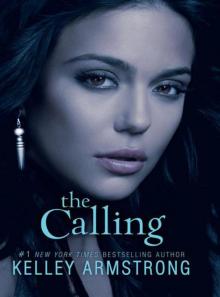 The Calling
The Calling Darkest Powers Bonus Pack
Darkest Powers Bonus Pack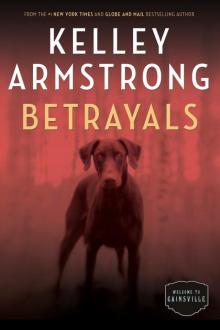 Betrayals
Betrayals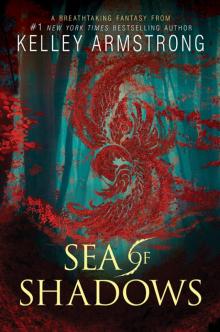 Sea of Shadows
Sea of Shadows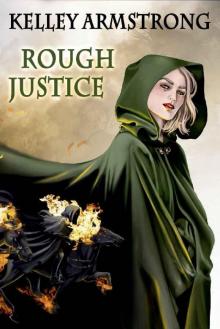 Rough Justice
Rough Justice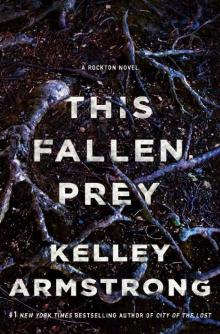 This Fallen Prey
This Fallen Prey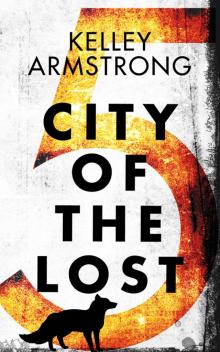 City of the Lost: Part Five
City of the Lost: Part Five Perfect Victim
Perfect Victim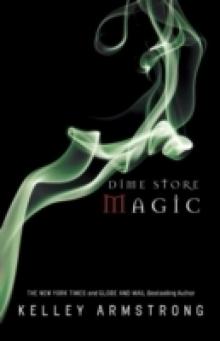 Dime Store Magic
Dime Store Magic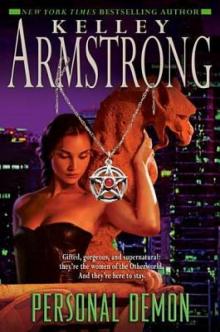 Personal Demon
Personal Demon Haunted
Haunted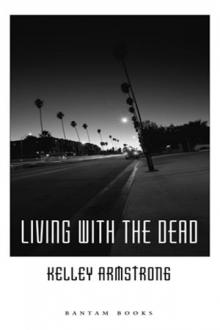 Living With the Dead
Living With the Dead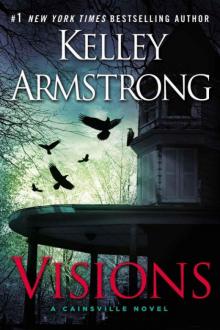 Visions
Visions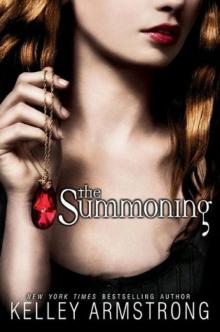 The Summoning
The Summoning Broken
Broken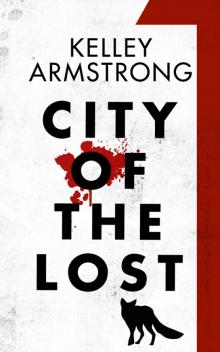 City of the Lost: Part One
City of the Lost: Part One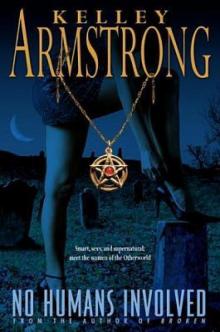 No Humans Involved
No Humans Involved The Awakening
The Awakening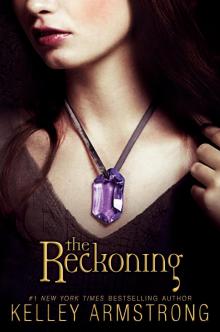 The Reckoning
The Reckoning The Gathering
The Gathering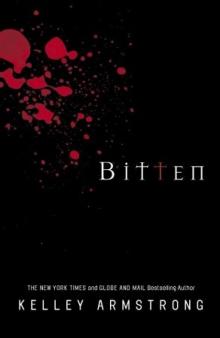 Bitten
Bitten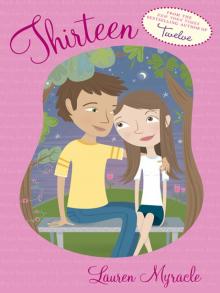 Thirteen
Thirteen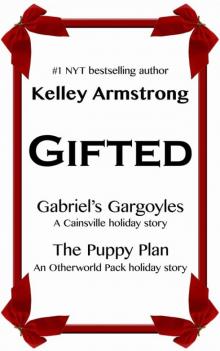 Gifted
Gifted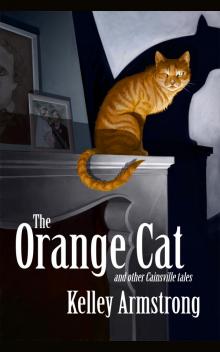 The Orange Cat and Other Cainsville Tales
The Orange Cat and Other Cainsville Tales Darkest Powers Bonus Pack 2
Darkest Powers Bonus Pack 2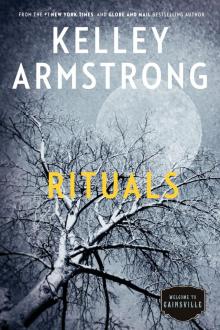 Rituals
Rituals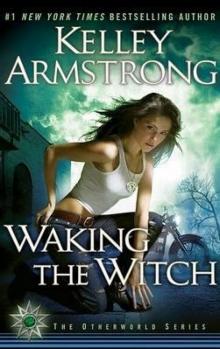 Waking the Witch
Waking the Witch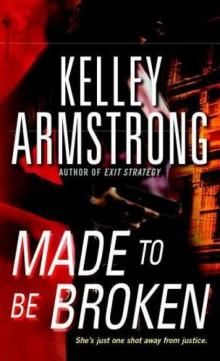 Made to Be Broken
Made to Be Broken Lost Souls
Lost Souls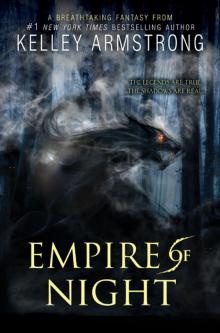 Empire of Night
Empire of Night Wild Justice
Wild Justice Double Play
Double Play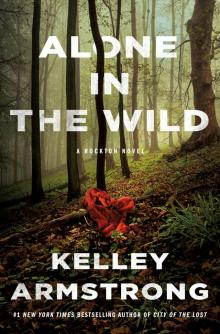 Alone in the Wild
Alone in the Wild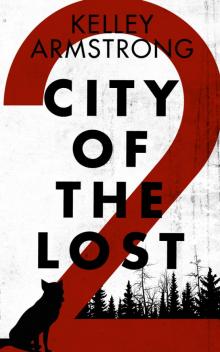 City of the Lost: Part Two
City of the Lost: Part Two A Stranger in Town
A Stranger in Town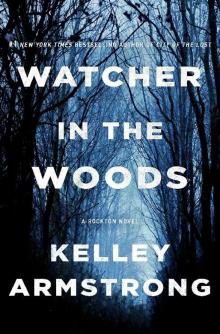 Watcher in the Woods: A Rockton Novel
Watcher in the Woods: A Rockton Novel Atoning
Atoning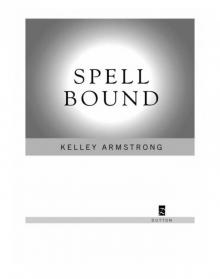 Spellbound
Spellbound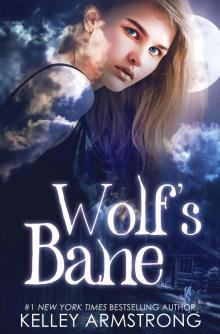 Wolf's Bane
Wolf's Bane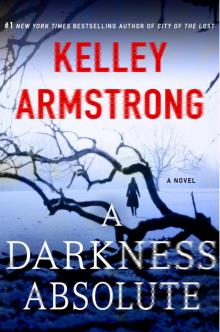 A Darkness Absolute
A Darkness Absolute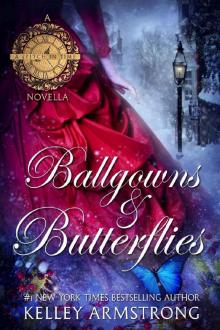 Ballgowns & Butterflies: A Stitch in Time Holiday Novella
Ballgowns & Butterflies: A Stitch in Time Holiday Novella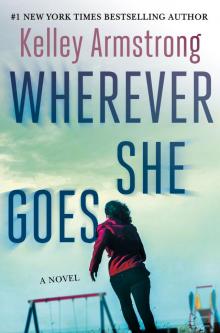 Wherever She Goes
Wherever She Goes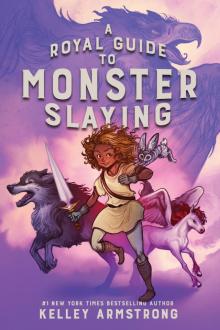 A Royal Guide to Monster Slaying
A Royal Guide to Monster Slaying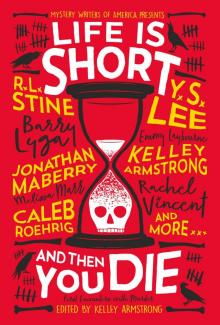 Life Is Short and Then You Die
Life Is Short and Then You Die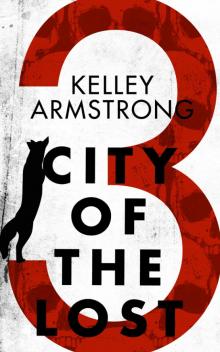 City of the Lost: Part Three
City of the Lost: Part Three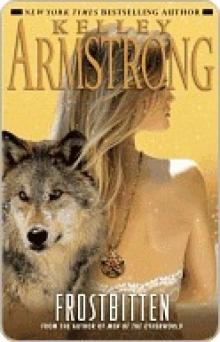 Frostbitten
Frostbitten A Stitch in Time
A Stitch in Time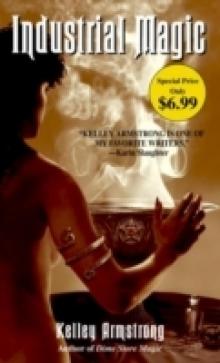 Industrial Magic
Industrial Magic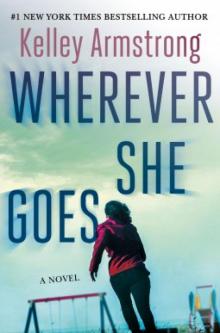 Wherever She Goes (ARC)
Wherever She Goes (ARC)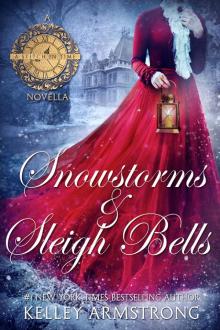 Snowstorms & Sleigh Bells: A Stitch in Time holiday novella
Snowstorms & Sleigh Bells: A Stitch in Time holiday novella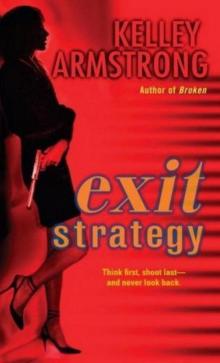 Exit Strategy
Exit Strategy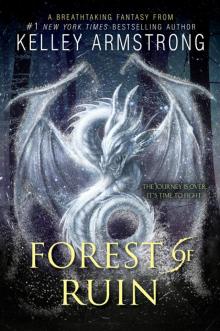 Forest of Ruin
Forest of Ruin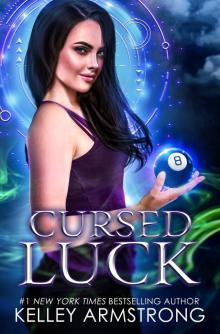 Cursed Luck, Book 1
Cursed Luck, Book 1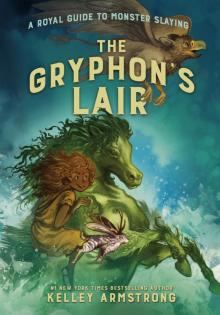 The Gryphon's Lair
The Gryphon's Lair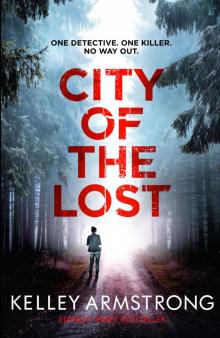 City of the Lost
City of the Lost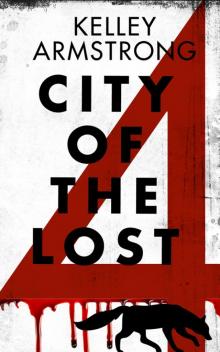 City of the Lost: Part Four
City of the Lost: Part Four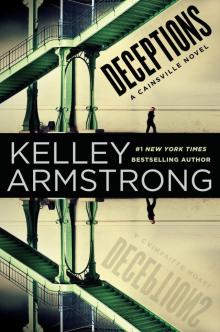 Deceptions
Deceptions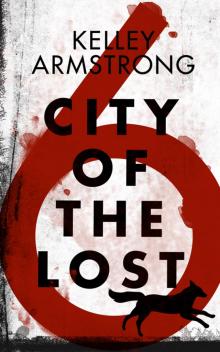 City of the Lost: Part Six
City of the Lost: Part Six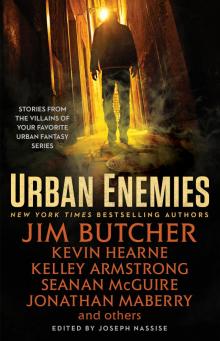 Urban Enemies
Urban Enemies Stolen
Stolen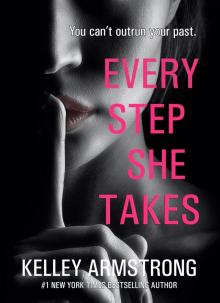 Every Step She Takes
Every Step She Takes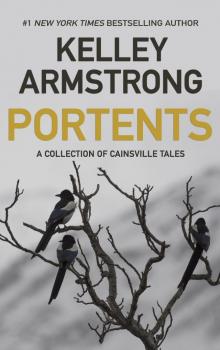 Portents
Portents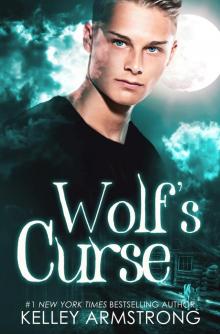 Wolf's Curse
Wolf's Curse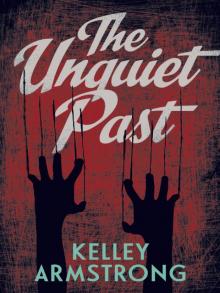 The Unquiet past
The Unquiet past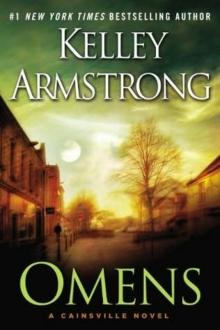 Omens ct-1
Omens ct-1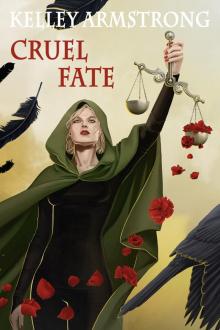 Cruel Fate
Cruel Fate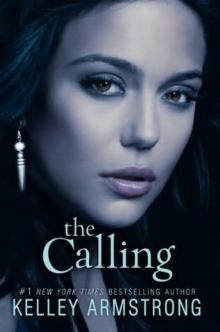 The Calling dr-2
The Calling dr-2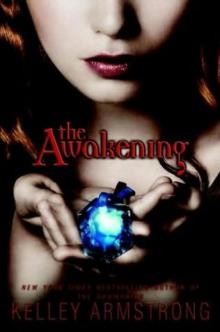 The Awakening dp-2
The Awakening dp-2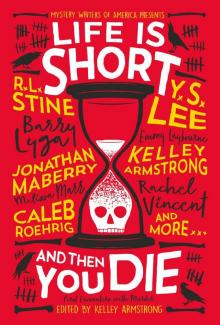 Life Is Short and Then You Die_First Encounters With Murder From Mystery Writers of America
Life Is Short and Then You Die_First Encounters With Murder From Mystery Writers of America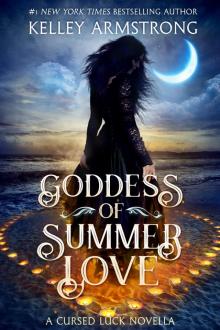 Goddess of Summer Love: a Cursed Luck novella
Goddess of Summer Love: a Cursed Luck novella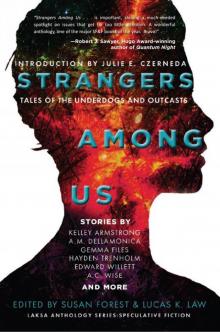 Strangers Among Us
Strangers Among Us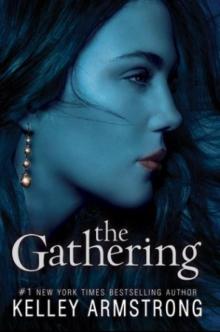 The Gathering dr-1
The Gathering dr-1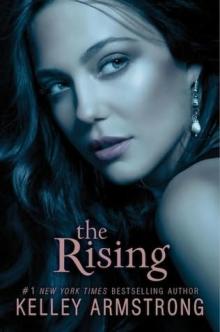 The Rising dr-3
The Rising dr-3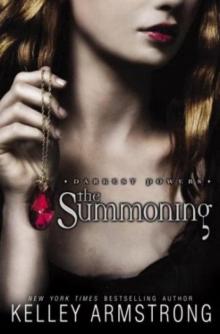 The Summoning dp-1
The Summoning dp-1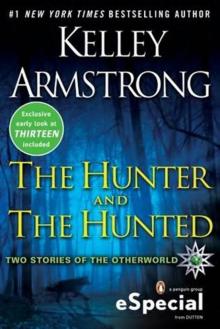 The Hunter And The Hunted
The Hunter And The Hunted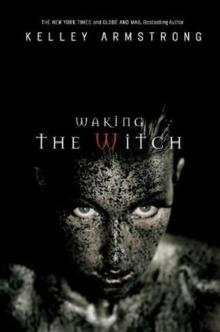 Waking the Witch woto-11
Waking the Witch woto-11